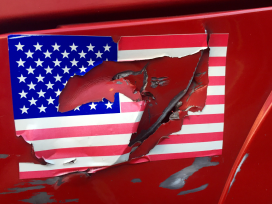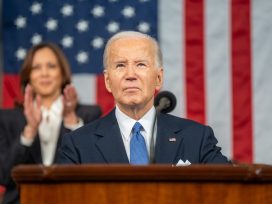An American businessman enters a town, and wants to establish himself as someone who can be trusted, someone to do business with. It’s 1904. He has no contacts. But no matter: he knows there’s a surefire way to pass the credit checks of his new neighbours. The businessman joins a church. Max Weber noticed this peculiar system of trust on a trip to America, and observed that “Admission to the congregation is recognised as an absolute guarantee of the moral qualities of a gentleman, especially of those qualities required in business matters.” Of course, he added, scarcely a generation after his visit, the habit died away. Fraternal secular organisations cropped up in its place. The church was no longer the gateway to the brotherhood of businessmen. But if the 2012 Republican primaries tell us anything about the intersection of American trust and religion, it’s that the tradition to which Weber read the last rites is anything but expired.
When Texas governor Rick Perry decided he wanted to run for the President of the United States, he too may have felt he needed a little extra credit from the Republican base. But Perry didn’t just join a church – the longtime Methodist turned non-denominational Evangelical Christian was already affiliated. Instead, he issued a calling to like-minded believers around the nation: come to Reliant Stadium in Houston on a hot August day, and we will fast and pray for America, together. He wrote: “There is hope for America. It lies in heaven, and we will find it on our knees.” Exactly one week later, Perry announced his candidacy for the Republican nomination.
 Over 35 000 people answered Perry’s call and arrived for the day of repentance, named “The Response”, during which a who’s-who of Religious Right speakers prayed with the assembled for Christ to move in America’s government, culture and media. Perry and his spokesperson were careful to note that the event was 1) non-exclusive, i.e. non-Christians would not be turned away at the door, and 2) non-political. Perry would not be giving a speech. Despite a personal note from Perry on the Response’s website, his involvement was kept vague. Eventually, his people confirmed that the governor would humbly read a passage of scripture from the book of Joel. But the passage he selected was anything but benign. Perry was sounding the alarm to the audience in front of him: America is in trouble. Its only remedy? God. And the only way God will deign to help the American people? Well, that’s all in Scripture, of course.
Over 35 000 people answered Perry’s call and arrived for the day of repentance, named “The Response”, during which a who’s-who of Religious Right speakers prayed with the assembled for Christ to move in America’s government, culture and media. Perry and his spokesperson were careful to note that the event was 1) non-exclusive, i.e. non-Christians would not be turned away at the door, and 2) non-political. Perry would not be giving a speech. Despite a personal note from Perry on the Response’s website, his involvement was kept vague. Eventually, his people confirmed that the governor would humbly read a passage of scripture from the book of Joel. But the passage he selected was anything but benign. Perry was sounding the alarm to the audience in front of him: America is in trouble. Its only remedy? God. And the only way God will deign to help the American people? Well, that’s all in Scripture, of course.
“Blow the trumpet in Zion,” he recited, and the audience cheered. He continued reading, “Declare a holy fast, call a sacred assembly. Gather the people, consecrate the assembly.”
On the floor of the stadium, spilling up into the seats, were Evangelical Christians who said they were there to answer the call in Joel. It was God’s call, via Rick Perry, and, at least for that day in Houston, Perry was anointed: he was exactly what the assembled were waiting for. The believers danced in the aisles, raised their hands to the Lord while swaying to praise music, and listened to a long list of speakers talk about a new Great Awakening.
Perry’s announcement of his candidacy was in South Carolina at a conservative conference, while he was riding the wave of media attention and Evangelical support he collected at his prayer rally. Perry said, modestly nominating himself to lead a country to Christian righteousness, “It’s time for America to believe again.”
But in what?
Religion – which, for most discussions of religion in politics in the US, refers to Christianity – is not the most important factor in the Republican primaries, and certainly not in the general election. And yet, as Weber noticed, it’s always there, imprinted on the words the candidates say and the actions they take. Those running for the presidency, no matter what they believe, know this. The successful navigation of belief is essential to an American political campaign, especially for Republicans.
For two-thirds of American voters, it’s important for a presidential candidate to have strong religious beliefs. That number is even higher among Republicans, and it’s nearly nine in ten for Evangelical voters. And one in five voters are less likely to vote for a candidate with strong religious beliefs that are different from their own. Voters want a candidate they identify with, politically, personally and dogmatically.
The US Census isn’t legally allowed to ask required questions about denominational affiliations, so exact numbers on American adherence don’t actually exist, but there are numbers that, based on a number of surveys, seem reliable. So, with that in mind, the following is the approximate religious makeup of the US, in broad strokes: about 75 per cent of the American adult population are Christian, according to the 2008 American Religious Identification Survey (ARIS). Less than four per cent of Americans adhere to a non-Christian religion, and about 14 per cent are unaffiliated, a category that includes atheists and agnostics. That is, if you trust those surveyed to report accurately on their religious beliefs and practices. An often-cited Gallup poll, for example, says that about 40 per cent of Americans attend church on any given Sunday, though more rigorous studies of church attendance suggest the number is actually about half that.
Any way you cut it, Americans are overwhelmingly Christian in adherence. And, compared to most European countries, Americans are more ready to claim religion as a “very important” influence on and aspect of their lives. According to a Pew report released this November, 50 per cent of Americans claim this is true for them. By contrast, only 17 per cent of people in Britain share this view. Why the difference? Another result from the Pew report gives a clue. In the US, 53 per cent of Americans have decided that a belief in God is “a necessary foundation for morality and good values”. In Britain, only 20 per cent of people believe that.
There are two fruitful inferences about the intersection of religion and American politics that one can make from that cluster of statistics. First, that a majority of Americans will consider belief in God to be a prerequisite to the presidency. And second, that a majority of Americans believe that a certain personal morality is necessary in civic leadership. Which brings us back to the good, church-going American businessman.
To explain the role of religion in American politics is to explain American politics. The rope doesn’t neatly untwist into distinct strands. But at a recent Republican presidential debate – at which all but two candidates were present – many of the contenders did a lot of work to reveal just how their beliefs are tied up into their vision of governance.
About 75 per cent of white Evangelical Protestants (who make up about a quarter of the population) vote Republican. They’re a significant portion of the Republican voting base, and their support – while not necessarily kingmaking – is highly sought after by those running for office. In this primary race, there is no clear candidate claiming broad Evangelical support, and any candidate seeking to challenge frontrunner Mitt Romney, a Mormon who has long had lukewarm at best support from Evangelical Americans, would need a resounding endorsement.
Rick Perry, Michelle Bachmann, Rick Santorum and Newt Gingrich all compete for this endorsement. All have positioned themselves as social and fiscal conservatives, and all have learned to speak American Evangelical. Ron Paul – a Christian as well – has his own small but passionate base of supporters. At various points this fall, Perry, Herman Cain (who dropped out of the race in December) and Gingrich have had poll numbers indicating that they might become a challenger to what is seen by many to be Romney’s inevitability as the Republican nominee. Perry, whose debating skills have hurt more than helped his campaign, coasted into the race on the momentum of the Response, and the hopes of Evangelical leaders for an electable candidate they actually liked. Newt and Cain’s surges were mainly a result of good debate performances. And yet, challenging Romney for the nomination in a serious way has proven to be a formidable task. The fact that so many candidates are trying to overtake Romney speaks to a dissatisfaction from the Republican base. That dissatisfaction has something, but not everything, to do with religion. And yet, religion might be one of Romney’s weak spots.
All but two Republican candidates followed the Weberian businessman and tried to earn the trust of the Evangelical base at large by going to a church for the Thanksgiving Family Forum, a casual debate on social issues. The two candidates not present were Mitt Romney, who declined an invitation from Bob Vander Plaats, who runs debate sponsor Family Leader, and John Huntsman, who simply wasn’t invited. The debate was in a church in Des Moines, Iowa and moderated by Frank Luntz, a Fox News analyst and focus group facilitator who repeatedly reminded the audience that this debate was going to be different. No gotcha questions. No 30-second time limits. In other words, none of the traps laid by a liberal media perceived to be out to get the candidates at the table. And, bonus: the candidates actually sat at a dining room table decorated for Thanksgiving, complete with fake dried leaves, mini pumpkins and flower arrangements.
The Thanksgiving Family Forum was not widely seen, or widely covered, here in the US. It wasn’t televised nationally. Instead, there was a livestream available online. Its content, however, is perhaps one of the clearest group distillations of belief in the Republican primary field thus far.
Bizarrely, the debate began with the men sitting down to the table, and Michele Bachmann, the only female Republican presidential candidate, picking up a pitcher and walking the length of the table, pouring each candidate and the moderator a glass of water. The moment resonated with a previous Bachmann debate moment from August, when a moderator asked the candidate whether her adherence to Ephesians 5:22: “Wives, submit to your own husbands”, would apply to her decisions as president. At the time, the audience hissed and booed the idea of the question. But in this scene, Bachmann seemed to embrace the facade of a woman at a traditional American family dinner. The image provided a striking portrait of Bachmann’s struggle as a candidate.
The Thanksgiving debate was really more of a dinner table chat. Topic: the extent to which Judeo-Christian values should be enforced through government. As Rick Perry explained at the table, discussing whose set of values should be guiding government policy: “Whose values? And let me tell you, it needs to be our values – values and virtues that this country was based upon in Judeo-Christian founding fathers.”
Not to be outdone, Newt Gingrich had this to say: “I wouldn’t have anybody teaching who felt uncomfortable explaining what the founding fathers meant when they said that our rights come from our creator.”
Santorum managed to slip in an early reference to Sharia law: “Unlike Islam, where the higher law and the civil law are the same, in our case, we have civil laws. But our civil laws have to comport with the higher law.”
The picture that emerged is similar to the one created by Perry’s Response rally. Both events were securely situated in the theology of Dominionism, a much-discussed but relatively small (measuring by adherents) branch of Evangelical Christianity. Dominionism is not so much a denomination of Christianity as a strategy of it. It’s an umbrella term for the belief that Christians must strongly influence or outright control civil society and its institutions of power: government, business and media. Doing so, the belief dictates, would bring the country back to God, and this is seen as the only possible way to extract the United States from its current crisis.
Mitt Romney, meanwhile, has stayed away from religious conversations as a candidate, which is probably a smart move, at least until the general election. Romney is Mormon. And the “Mormon question”, as it’s been called, has been one of the prime religion debates in the US among those who follow religion in politics.
“What’s unique about the Republican primary race this year is that we have not one but two Mormon candidates,” said Dr. Robert P Jones, CEO of Public Religion Research Institute (PRRI). PRRI published the results of their annual American Values Survey for 2011. They measure the “moving” elements in American public religion. This year, they took the American public’s temperature on the “Mormon question”. Romney, along with John Huntsman, has faced scrutiny from Republican voters over his beliefs, which 36 per cent of Americans do not believe are Christian.
“This is a very delicate balance Romney has to walk,” Jones explained, in order to get through the Republican primaries to what may be greener pastures should he get the nomination. The full impact of Romney’s Mormon faith on his candidacy – the answer to the Mormon question, if you will – has not been fully answered. According to PRRI’s poll, only four in ten Americans can correctly identify Romney’s religion. And Jones explained that, based on the available data, an increase in awareness of Romney’s Mormonism among conservative voters would be harmful to his favourability rating.
In January, the race for the Republican nomination to run against Obama in 2012 kicks into high gear. The first big event of the primary season is traditionally the Iowa Caucuses on 3 January, followed closely by the New Hampshire Primaries on 10 January. The results of both caucuses and primaries are the selection of a small number of state delegates, who in turn pick the party’s nominees for president and vice president. Each state has a primary election or caucus some time between January and June in the election year, but the earlier events are more influential.
The early primary events are mainly significant for the media attention they give to candidates, helpful in some cases, harmful in others. But the primaries are far from a cold open to the drama of a presidential election. Since early 2011, candidates have been building campaigns. Some, like Sarah Palin, tested the waters for a run and found the temperature unfavourable. Others, like Perry, were urged to run by conservative and Evangelical leaders desperate for an electable candidate with whom they could identify.
“Electability” itself, of course, is a loaded term, and is a perception mediated through the press, pundits and polls. But at least for the Republican field, it is safe to say that correct religiosity is an important criterion for candidates.
So will any of these candidates actually get elected? Who knows? Until the primary days get underway in 2012, it’s too early to tell. And, with the “Mormon question” still twisting in the wind, there are few clues out there to give a clearer picture. Although Romney has kept his frontrunner status locked up, the fall has seen challenges, at least as far as the polls are concerned, from Perry in early September, Cain in October and Newt Gingrich in November. While Romney should do well during the primaries in New Hampshire, the state adjacent to Massachusetts where he served as governor, Gingrich has been seriously challenging, and sometimes surpassing, Romney in polls in Iowa and other early primary states. Gingrich, as improbable as it might seem, could pose a lasting challenge to Romney.
Unlike the previous candidates approaching Romney in the polls, Gingrich comes off as smart enough to actually serve as president, and hits many of the right notes: he combines a professorial tone (which has won him conservative fans in the debates) with a Tea Party appeal. He’s also established a place among the Religious-Right-worthy candidates. This is all despite what some see as substantial moral baggage: Gingrich has been married three times, and the relationship that led to his current marriage began while the candidate was still married to someone else. But it is the current wife who encouraged Gingrich to convert to Catholicism in 2009, and the currency of newfound religious belonging and commitment could be stronger than the moral indiscretions of his past.
In any case, PRRI’s American Values Survey has made one thing clear: 67 per cent agreed with the statement that it was important that an American President had some kind of religious belief. The next American president, Republican or Democrat, will not be an atheist.

 Over 35 000 people answered Perry’s call and arrived for the day of repentance, named “The Response”, during which a who’s-who of Religious Right speakers prayed with the assembled for Christ to move in America’s government, culture and media. Perry and his spokesperson were careful to note that the event was 1) non-exclusive, i.e. non-Christians would not be turned away at the door, and 2) non-political. Perry would not be giving a speech. Despite a personal note from Perry on the Response’s website, his involvement was kept vague. Eventually, his people confirmed that the governor would humbly read a passage of scripture from the book of Joel. But the passage he selected was anything but benign. Perry was sounding the alarm to the audience in front of him: America is in trouble. Its only remedy? God. And the only way God will deign to help the American people? Well, that’s all in Scripture, of course.
Over 35 000 people answered Perry’s call and arrived for the day of repentance, named “The Response”, during which a who’s-who of Religious Right speakers prayed with the assembled for Christ to move in America’s government, culture and media. Perry and his spokesperson were careful to note that the event was 1) non-exclusive, i.e. non-Christians would not be turned away at the door, and 2) non-political. Perry would not be giving a speech. Despite a personal note from Perry on the Response’s website, his involvement was kept vague. Eventually, his people confirmed that the governor would humbly read a passage of scripture from the book of Joel. But the passage he selected was anything but benign. Perry was sounding the alarm to the audience in front of him: America is in trouble. Its only remedy? God. And the only way God will deign to help the American people? Well, that’s all in Scripture, of course.




